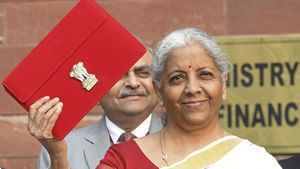Israel celebrated the release of three hostages held by Hamas, marking a significant moment of relief amid the protracted conflict. Ofer Kalderon, Yarden Bibas, and Keith Samuel Siegel were freed on Saturday morning, February 1, 2025. Their release follows more than 15 months of captivity and is the first stage of a ceasefire agreement between Israel and Hamas.
The two Israeli men Kalderon and Bibas were initially handed over to representatives of the Red Cross in Khan Younis, Gaza. Later, Siegel, who also holds U.S. citizenship, was released separately. This development has brought immense joy to the families of the hostages, but it has come at the cost of releasing 183 Palestinian prisoners, some who have been incarcerated for serious offenses.
Yarden Bibas, 34, returning home after spending 484 days as a captive, expressed mixed emotions upon hearing his family’s words of joy. His two sons, Kfir, now two years old, and Ariel, five, who were kidnapped alongside him, remain unaccounted for. The last confirmed sighting of the boys was when they were shown being marched through Gaza by Hamas fighters. The family’s anguish was palpable; they lamented the absence of Shiri, Bibas’s wife, and called on the public for privacy during this turbulent time.
The family of Ofer Kalderon, who was seized from Kibbutz Nir Oz on October 7, 2023, echoed similar sentiments. They expressed being "overwhelmed with joy" at finally embracing Kalderon, who endured remarkable mental and physical hardship throughout his captivity. "Ofer survived this hell; we are proud of his ability to hold onto hope," his family stated. His children Erez and Sahar, released during previous negotiations, have long aimed for their father’s return.
The Israeli Defense Forces (IDF) and other security agencies facilitated the return of the hostages. According to their statement, the two freed individuals were already en route to Israel where they would undergo medical evaluations and reunite with their families. Rear Admiral Daniel Hagari, military spokesperson, noted the party’s efforts to facilitate the hostages’ return, assuring them of safety and security as they transition back to civilian life.
This hostage handover was underpinned by broader geopolitical dynamics, including the opening of the Rafah crossing from Gaza to Egypt, allowing for the passage of Palestinian patients requiring medical attention. This crossing had been closed intermittently resulting from the Israeli-Egyptian blockade, which limited travel and access to necessary services for Gaza’s residents. This shift has provided some hope, albeit amid darker circumstances.
The release was hailed as "a ray of light" by the Hostages and Missing Families Forum, reflecting the collective relief felt by many who have endured the emotional strain accompanying the captivity of loved ones. The forum emphasized the importance of continuing negotiations for the return of all hostages, both living and deceased, from the clutches of militants.
Global reactions have poured in from various quarters, including French President Emmanuel Macron, who expressed his joy over Kalderon’s release after what he termed "483 days of unimaginable hell." Meanwhile, the specter of uncertainty looms over the lives of the Bibas children and their mother, with the family expressing deep anxiety concerning their wellbeing, particularly after unverified claims about their fates surfaced through various channels.
Behind these individual stories lies the broader narrative of human suffering and resilience, as families like the Bibas and Kalderons hold onto hope amid chaos. The humanitarian crisis necessitates urgent action and strong negotiations to safeguard the future of those still held hostage.
While the Israeli state celebrates the return of its citizens, it must now address the repercussions of releasing numerous Palestinian inmates, which could involve fierce opposition from segments of the populace and political factions within Israel. Tensions remain palpable as the government navigates the complex aftermath of this latest hostage exchange.
Outside of this direct political response, the individuals impacted continue to seek closure and healing from their harrowing experiences. Captivity changes lives fundamentally, and the adjustment to life outside must be navigated with care, support, and compassion.
Overall, the release of the three captured individuals signifies not just personal victories but also reflects the persistent and often heartbreaking quest for peace and reconciliation within one of the world's most protracted conflicts.



